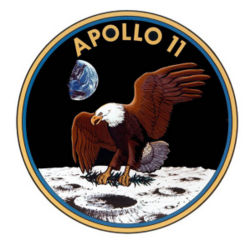Difference between revisions of "Apollo 11"
| Line 86: | Line 86: | ||
The command module is displayed at the [[National Air and Space Museum]], [[Washington, D.C.]] The lunar module was jettisoned on [[21 July]], [[1969]]. Impact site of the lunar module on the Moon is unknown. | The command module is displayed at the [[National Air and Space Museum]], [[Washington, D.C.]] The lunar module was jettisoned on [[21 July]], [[1969]]. Impact site of the lunar module on the Moon is unknown. | ||
| − | The command module and its crew were flawlessly recovered by the aircraft carrier [[USS Hornet]]. The ship is now open to the public as a museum in Alameda, CA. | + | The command module and its crew were flawlessly recovered by the aircraft carrier [[USS Hornet CV-12]]. The ship is now open to the public as a museum in Alameda, CA. |
''For an alternative view, see:'' [[Apollo moon landing hoax accusations]] | ''For an alternative view, see:'' [[Apollo moon landing hoax accusations]] | ||
Revision as of 07:52, 9 July 2004
| Mission Insignia | |
|---|---|
| Mission Statistics | |
| Mission Name: | Apollo 11 |
| Call Sign: | Command module: Columbia Lunar module: Eagle |
| Number of Crew: |
3 |
| Launch: | July 16, 1969 13:32:00 UTC Kennedy Space Center LC 39A |
| Lunar Landing: | July 20, 1969 20:17:40 UTC 1.1 N, latitude, 23.8 E Mare Tranquillitatis (Seat of Tranquility) |
| Lunar EVA length: |
2 h 31 min 40 s |
| Lunar Surface Time: |
21 h 36 min 20 s |
| Lunar Sample Mass: |
21.55 kg |
| Landing: | July 24, 1969 16:50:35 UTC 13 deg 19 min N, 169 deg 9 min W |
| Duration: | 195 h 18 min 35 s |
| Number of Lunar Orbits: |
30 |
| Time in Lunar Orbit: |
59 h 30 min 25.79 s |
| Mass: | CSM 28,807 kg; LM 15,103 kg |
| Crew Picture | |
File:Ap11-s69-31740.jpg Apollo 11 crew portrait (L-R: Armstrong, Collins, and Aldrin) | |
| Apollo 11 Crew | |
The Apollo 11 mission was the first manned lunar landing. It was the fifth manned mission in the Apollo program.
That's one small step for [a] man, one giant leap for mankind.
- ―Neil Armstrong
The mission was launched on 16 July 1969 with astrounauts Neil Armstrong, Michael Collins and Buzz Aldrin. On July 20, Armstrong became the first man to walk on the Moon, followed by Aldrin. Collins remained in orbit above the Moon. The astronauts returned safely to earth four days later.
Mission notes
- On July 20, while on the far side of the moon, the lunar module, called "Eagle," separated from the "Columbia". Collins remained aboard Columbia while Eagle, carrying Armstrong and Aldrin, descended to the surface.
- After a careful visual inspection, Eagle fired its engine and began its descent. During the descent to the lunar surface, the astronauts noticed that the intended landing site was rockier than surveillance photographs had indicated. Armstrong took manual control of the lunar module at that point, and guided it to a landing on a smoother patch of ground, later known as Tranquility Base.
- On July 20 at 10:56 PM EDT, six and a half hours after landing, Armstrong made his descent to the moon surface and made the famous statement: "That's one small step for [a] man, one giant leap for mankind." (Though he apparently dropped the "a", changing the meaning of the statement--some historians have been charitable and called this a radio communication failure rather than a simple mistake by Armstrong).
- After 21 hours and 36 minutes, Eagle fired its ascent engines and rendezvoused with the Columbia for the return flight. 22 kg of lunar samples were collected. The astronauts returned to earth on July 24, welcomed as heroes. The splashdown point was 13 deg 19 min N, 169 deg 9 min W, 400 miles SSW of Wake Island and 24 km (15 mi) from the recovery ship USS Hornet.
Mission parameters
- Mass:
- Launch mass: 2,923,387 kg
- Total spacecraft: 46,678 kg
- CSM mass: 30,320 kg, of which CM was 5960 kg, SM 24,360 kg
- LM mass: 16,448 kg , of which ascent stage was 4985 kg, descent stage 11,463 kg
- Earth orbits: one and a half before leaving for Moon, about one on return
- Lunar orbits: 30
Crew
File:Ap11-s69-31740.jpg Apollo 11 crew portrait (L-R: Armstrong, Collins, and Aldrin) |
File:Apollo 11 launch.jpg Apollo 11 launch (NASA) |
| Neil Armstrong, commander | Michael Collins, command module pilot | Buzz Aldrin, lunar module pilot |
File:Ap11-KSC-69PC-442.jpg Apollo 11 at Liftoff (NASA) |
File:Aldrin Apollo 11.jpg Edwin E. Aldrin with the only image of Armstrong reflected in Aldrin's helment (NASA) |
File:Apollo11.png Aldrin stands next to the PSEP, with Lunar Module in background (NASA) |
Post scriptum
The command module is displayed at the National Air and Space Museum, Washington, D.C. The lunar module was jettisoned on 21 July, 1969. Impact site of the lunar module on the Moon is unknown.
The command module and its crew were flawlessly recovered by the aircraft carrier USS Hornet CV-12. The ship is now open to the public as a museum in Alameda, CA.
For an alternative view, see: Apollo moon landing hoax accusations
External links
- NASA: Apollo Lunar Surface Journal
- Apollo 11 entry in Encyclopedia Astronautica
- Map of activities on Lunar surface for Apollo 11
- Description of The Lunar Module Computer
Reference
- NASA NSSDC Master Catalog
- APOLLO BY THE NUMBERS: A Statistical Reference by Richard W. Orloff (NASA)
| Preceded by : Apollo 10 |
Apollo program | Followed by : Apollo 12 |
da:Apollo 11 de:Apollo 11 fr:Apollo 11 he:אפולו 11 ja:アポロ11号 nl:Apollo 11 pl:Apollo 11 (astronautyka) zh:阿波罗11号







